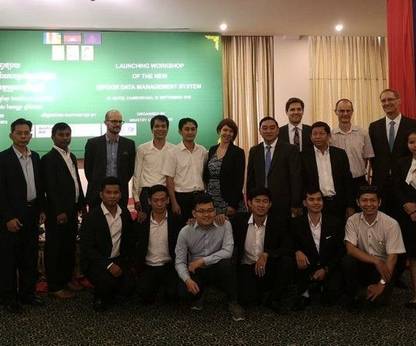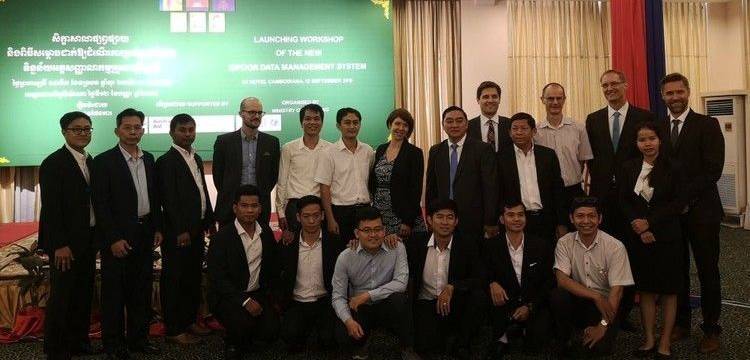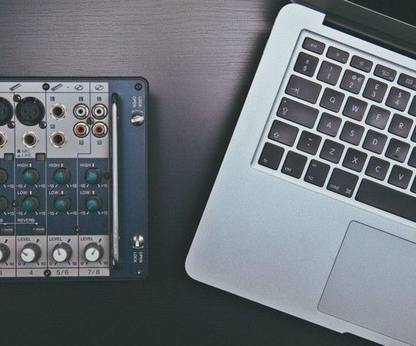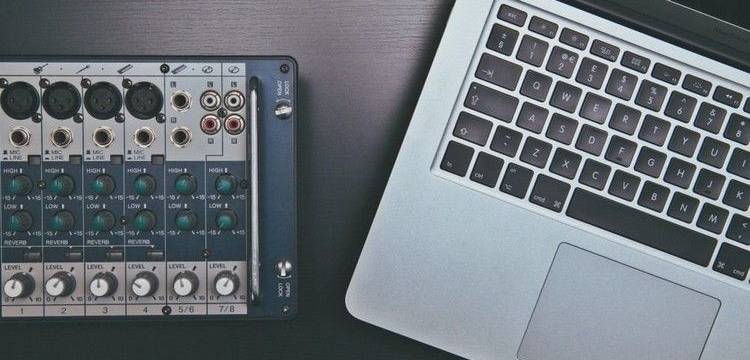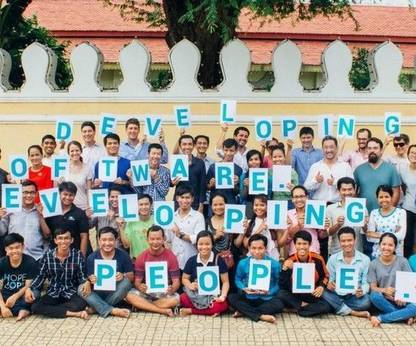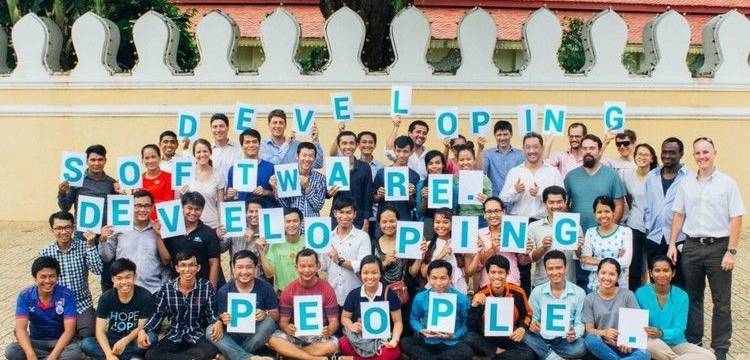ONLINE EDUCATION WITHOUT THE INTERNET
45.6% of the world’s population does not have access to the internet. This restriction increases the knowledge gap between those with internet and those without internet access. This challenge is exactly what the nonprofit, World Possible, is tackling with their Remote Area Community Hotspot for Education & Learning (RACHEL).
RACHEL is a portable plug-and-play server which stores offline educational resources and via a local (offline) wireless connection makes the content available. RACHEL comes pre-loaded with content from educational websites like Wikipedia, Khan Academy, and Project Gutenberg. This content is repackaged and downloaded for offline use.
There are now schools in over 40 countries using RACHEL. Access to a vast digital library of educational resources provides improved knowledge and motivation for children to attend schools.
MOBILE GENDER GAP
Research has shown that rural India has a mobile gender gap. Women are 10% less likely to own a mobile phone and 313 million fewer women are using mobile phones compared to men. Even if those women do have access to a mobile phone, chances are men (fathers, husbands, brothers) are closely monitoring their use.
Additional research shows that men and women also use broadband access very differently. Women use it to access information to help with their children’s homework, while men are more likely to use their smartphones for entertainment purposes. This means mobile phones are being used as a tool of exclusion instead of inclusion and development.
According to GSMA—an association of mobile operators and related companies devoted to supporting the standardizing, deployment and promotion of the GSM mobile telephone system—closing the gender gap over the next five years is a $140 billion commercial opportunity and a $700 billion economic opportunity.
Using ICT4D, GSMA is working in rural India to promote the positive use of mobile phones and to try and close this gender gap. By doing so, they are increasing both the educational and economic growth within the region.
DEVELOPMENT AND DIRT
African Soil Information Service is a global initiative to build digital soil maps for Africa. While soil may just be a one-meter thin layer of the earth’s crust, it is one of the most valuable resources in any nation since all living things depend on soil to survive.
With help from Quantitative Engineering Design (QED)—an organization working on solving engineering problems in global health and international developments—they measure the soil by zooming out from the ground level to space using Google Earth. They then crowdsource expert analysis of the satellite imagery, using the data to train a computer to make recommendations on where to collect soil.
This collected soil is then directly analyzed to gather information on what kind of fertilizer to add to support the efforts of agriculture programs country-wide. This is an example of how collaborative ICT4D can help a variety of communities across a particular region.
QED focuses on building data systems and machine learning solutions for agriculture and health projects. While many organizations, foundations, and universities work under the ICT4D umbrella, QED is different as it embeds within organizations needing assistance and develops solutions together with those seeking to solve local problems.
UBER-LIKE-AMBULANCE
Ambulances are a rare sight in developing countries, a fact I can attest to since moving to Cambodia. I’ve been at motorcycle races where the ambulance leaves for a lunch break while the race is still happening. Another example, in two districts of Tanzania, with a population of two million, there are only ten ambulances available. Due to the lack of transportation to hospitals, hundreds of pregnant women do not survive pregnancy or suffer the loss of their babies.
To combat this issue, Vodafone Foundation built an Uber-like system for pregnancy emergencies. A woman in need can call a free, 24-hour emergency line. After answering a set of questions, a community (taxi) driver is contacted via SMS. Once the woman is dropped off at her destination the driver is paid by Vodafone with mobile money via the M-Pesa system. This is a mobile phone-based money transfer financing and microfinancing service launched in 2007 by Vodafone, the largest mobile network operator in Tanzania.
During its first year, taxi drivers helped 2,523 women with pregnancy emergencies. More than 130 taxi drivers contributed to this system. Covering over 90% of maternal health emergency transportation. According to Vodafone, fatalities for women in need of transportation during pregnancy emergencies decreased by 80%.
CHILD MARRIAGE NO MORE
While the legal minimum age for marriage is 18, in Bangladesh, 66% of girls are married before their 18th birthday, 29% before their 15th birthday and 2% before their 11th birthday. Use of forged physical copies of birth certificates and ID cards is commonplace. According to Plan International, a girl married before the age of 18 is more likely to become a child-mother, drop out of school and become trapped in a lifetime of poverty.
Together with Plan International, the government of Bangladesh developed an app for marriage registrars to verify the actual age of the bride and groom. For areas without internet, an SMS-based version can be used. The app accesses the government’s database with the children identification documents. By focusing on the 100,000 marriage registrars in the country, Plan International has a higher chance of combating child marriage than changing the whole mindset of the general population.
In the first six months of the pilot test, the app prevented 3,700 child marriages. The trial period in five districts has been so successful the government and Plan International is working to roll out the app across the whole country.
PRECIOUS PLASTICS
Precious Plastic is an open-source project trying to boost plastic recycling worldwide.
They do this by providing tools and knowledge to people around the world, for free. One only needs to sign up to join their “army” of plastic combatants to gain access to a variety of plans for grinders, extruders, and 3D printing plans for various uses of different types of plastic. You also get to meet their community members who can help you solve problems, share ideas and sell/purchase products made from recycled plastic.

PAPER TO DIGITAL HEALTH SERVICES
Located in the Tonle Sap Lake region of Cambodia, The Lake Clinic (TLC) has provided quality health services to the area’s remote floating communities, 10,000 people who don’t typically have access to medical care. Previously, TLC’s five outpost health care facilities relied on paper-based record keeping for their patients. TLC medical staff soon realized this paper-based system was inefficient and looked into an electronic medical records system (EMR), however, the systems that were already available were unaffordable and difficult to deploy in TLC’s context.
In 2016, TLC was able to alter an open source clinic management tool called OpenMRS with the support of USAID’s Development Innovations. With their technical service provider, Mekom Solutions, TLC was able to update the tech to work in tandem with the guidelines of the Royal Government of Cambodia’s Ministry of Health.
The clinical team now uses a mobile phone network to provide internet hotspots to connect to the system. An offline data entry system has been optimized so that information synchronizes with the database when wireless internet connections have been re-established.
Since going from paper to digital, the TLC’s medical team can now see more patients. Despite the migratory nature of the region’s floating communities, the continuity of care is much more accurate. By creating a patient-centric information system, TLC is directly in line with the Ministry of Health’s own goals of moving towards a more centralized health information system that will help support policy and advocacy efforts.
PREY LANG ANTI-DEFORESTATION APP
The Prey Lang forest is a lowland evergreen forest, covering 520,000 hectares and supports the livelihoods of over 700,000 Cambodians, living in or within 10 kilometers of the forest. It is also home to endangered plant and animal species. The valuable timber is coveted by illegal loggers. Web Essentials joined forces with the missionary organization, Danmission, a group of local indigenous people and activists called the Prey Lang Community Network (PLCN) and the University of Copenhagen to produce a simple but powerful mobile and web app to prove illegal activity and land use change in the Prey Lang region.
Before the development of the app, data was collective on paper, which has a natural margin of error. The new app was developed with pictures to help even illiterate community members who had never operated a smartphone before. The app now allows the collection of photos, written or audio notes, that can be used as evidence. All this information is uploaded to a database in the cloud for analysis and quality control.
This is the first project of its kind in Cambodia, using ITC4D to empower the community and revolutionize communication methods between themselves and international organizations working on their behalf. Community members can collect data with the same accuracy as professionals that actively influence the higher up decision making that affects their livelihood. The app promotes local involvement in taking action against issues facing the community. By increasing local ownership and responsibility it supports a bottom-up approach that fosters sustainable monitoring independent of donor funding.
PLCN received the United Nations Development Programme (UNDP) backed 2015 Equator Prize, and the 2017 Yale International Society for Tropical Foresters (ISTF) and 2018 University of Copenhagen Innovation Prizes for using technology to document wildlife and forest crime.
Using ICT4D tools like the Prey Lang app to mobilize data collection on the ground on the ground is very effective in a development context. Development programs without data are like developers without laptops. Data is the key to measuring impact, and impact is what drives donor funding.
In a recent study polling senior development professionals in donor agencies, government, development consulting firms, nonprofit organizations, foundations, and corporations, 81% of respondents also said that easier tools for data collection and analysis would be a top enabler for aid and development organizations to deepen a culture of data use.
The Key to ICT4D Project Success
One of Web Essentials differentiators as an ICT4D implementation partner is that we have the unique advantage of a team on the ground in a developing nation, Cambodia, but also a seat in Switzerland. As an international team and a social enterprise, our different perspectives, cultures, and backgrounds make us more open, flexible, understanding and passionate about improving the lives of others around us.
We believe leveraging local expertise is the best approach for sustainable ICT4D solutions. Our Cambodian staff members are key stakeholders in any ICT4D project we do in partnership with local NGOs. Not only because many local aid organizations may lack computer software and hardware skills, but also because of the domain and cultural expertise they have in a Cambodian context.
That is the key to creating, real, sustainable impact.
Interested in learning how Web Essentials can help you create and implement your ICT4D project? Connect with us today so we can innovate for a better tomorrow together!
